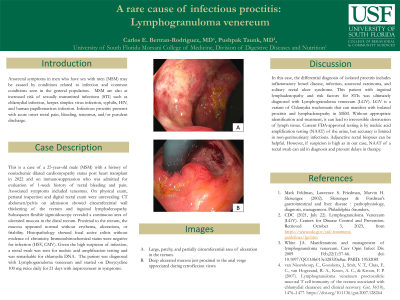Sunday Poster Session
Category: Colon
P0273 - A Rare Cause of Infectious Proctitis: Lymphogranuloma Venereum
Sunday, October 22, 2023
3:30 PM - 7:00 PM PT
Location: Exhibit Hall

Has Audio

Carlos Bertran-Rodriguez, MD
University of South Florida
Tampa, FL
Presenting Author(s)
Carlos Bertran-Rodriguez, MD, Sabrina Prabakaran, MD
University of South Florida, Tampa, FL
Introduction: Anorectal symptoms in men who have sex with men (MSM) may be caused by conditions related to infection and common conditions seen in the general population. MSM are also at increased risk of sexually transmitted infections (STI) such as chlamydial infection, herpes simplex virus infection, syphilis, HIV, and human papillomavirus infection. Infectious proctitis presents with acute onset rectal pain, bleeding, tenesmus, and/or purulent discharge.
Case Description/Methods: This is a case of a 25-year-old male (MSM) with a history of nonischemic cardiomyopathy s/p heart transplant in 2022 on immunosuppression who was admitted for evaluation of 1-week history of rectal bleeding and pain. Associated symptoms included tenesmus. Perianal inspection and digital rectal exam were unrevealing. CT abdomen pelvis on admission showed circumferential wall thickening of the rectum, and inguinal lymphadenopathy. Subsequent flexible sigmoidoscopy revealed a continuous area of ulcerated mucosa in the distal rectum. Proximal to the rectum, the mucosa appeared normal without erythema, ulcerations, or friability. Histopathology showed focal active colitis without evidence of chronicity. Immunohistochemical stains were negative for infection (HSV, CMV). Given high suspicion for infection, a rectal swab was sent for nucleic acid amplification testing and was remarkable for chlamydia DNA. Patient was diagnosed with Lymphogranuloma venereum and started on Doxycyline 100 mg twice daily for 21 days with improvement in symptoms.
Discussion: The differential of isolated proctitis in this case includes inflammatory bowel disease, infection, anorectal carcinoma, and solitary rectal ulcer syndrome. This patient with inguinal lymphadenopathy and risk factors for STIs was ultimately diagnosed with Lymphogranuloma venereum (LGV). LGV is a variant of Chlamydia trachomatis that can manifest with isolated proctitis and lymphadenopathy in MSM. Without appropriate identification and treatment, it can lead to irreversible destruction of lymph tissue. Current FDA-approved testing is by nucleic acid amplification testing (NAAT) of the urine, but this is thought to miss some LGV infections that are located outside the genitourinary tract. Adjunctive rectal biopsies can be helpful. However, if suspicion is high as in our case, NAAT of a rectal swab can aid in diagnosis and prevent delays in therapy.

Disclosures:
Carlos Bertran-Rodriguez, MD, Sabrina Prabakaran, MD. P0273 - A Rare Cause of Infectious Proctitis: Lymphogranuloma Venereum, ACG 2023 Annual Scientific Meeting Abstracts. Vancouver, BC, Canada: American College of Gastroenterology.
University of South Florida, Tampa, FL
Introduction: Anorectal symptoms in men who have sex with men (MSM) may be caused by conditions related to infection and common conditions seen in the general population. MSM are also at increased risk of sexually transmitted infections (STI) such as chlamydial infection, herpes simplex virus infection, syphilis, HIV, and human papillomavirus infection. Infectious proctitis presents with acute onset rectal pain, bleeding, tenesmus, and/or purulent discharge.
Case Description/Methods: This is a case of a 25-year-old male (MSM) with a history of nonischemic cardiomyopathy s/p heart transplant in 2022 on immunosuppression who was admitted for evaluation of 1-week history of rectal bleeding and pain. Associated symptoms included tenesmus. Perianal inspection and digital rectal exam were unrevealing. CT abdomen pelvis on admission showed circumferential wall thickening of the rectum, and inguinal lymphadenopathy. Subsequent flexible sigmoidoscopy revealed a continuous area of ulcerated mucosa in the distal rectum. Proximal to the rectum, the mucosa appeared normal without erythema, ulcerations, or friability. Histopathology showed focal active colitis without evidence of chronicity. Immunohistochemical stains were negative for infection (HSV, CMV). Given high suspicion for infection, a rectal swab was sent for nucleic acid amplification testing and was remarkable for chlamydia DNA. Patient was diagnosed with Lymphogranuloma venereum and started on Doxycyline 100 mg twice daily for 21 days with improvement in symptoms.
Discussion: The differential of isolated proctitis in this case includes inflammatory bowel disease, infection, anorectal carcinoma, and solitary rectal ulcer syndrome. This patient with inguinal lymphadenopathy and risk factors for STIs was ultimately diagnosed with Lymphogranuloma venereum (LGV). LGV is a variant of Chlamydia trachomatis that can manifest with isolated proctitis and lymphadenopathy in MSM. Without appropriate identification and treatment, it can lead to irreversible destruction of lymph tissue. Current FDA-approved testing is by nucleic acid amplification testing (NAAT) of the urine, but this is thought to miss some LGV infections that are located outside the genitourinary tract. Adjunctive rectal biopsies can be helpful. However, if suspicion is high as in our case, NAAT of a rectal swab can aid in diagnosis and prevent delays in therapy.

Figure: Infectious proctitis with mucosal ulcerations
Disclosures:
Carlos Bertran-Rodriguez indicated no relevant financial relationships.
Sabrina Prabakaran indicated no relevant financial relationships.
Carlos Bertran-Rodriguez, MD, Sabrina Prabakaran, MD. P0273 - A Rare Cause of Infectious Proctitis: Lymphogranuloma Venereum, ACG 2023 Annual Scientific Meeting Abstracts. Vancouver, BC, Canada: American College of Gastroenterology.
